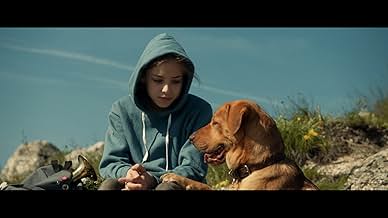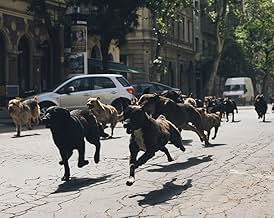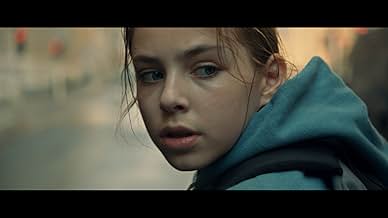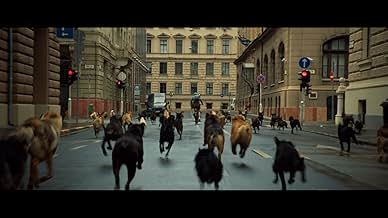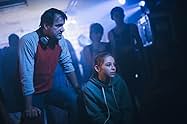Thirteen-year-old Lili fights to protect her dog Hagen. She is devastated when her father eventually sets Hagen free on the streets. Still innocently believing love can conquer any difficult... Read allThirteen-year-old Lili fights to protect her dog Hagen. She is devastated when her father eventually sets Hagen free on the streets. Still innocently believing love can conquer any difficulty, Lili sets out to find her dog and save him.Thirteen-year-old Lili fights to protect her dog Hagen. She is devastated when her father eventually sets Hagen free on the streets. Still innocently believing love can conquer any difficulty, Lili sets out to find her dog and save him.
- Awards
- 8 wins & 21 nominations total
Lili Horvát
- Anya
- (as Horváth Lili Anna)
Featured reviews
At first it seems like a children's movie, but then it becomes too dark. It's a well made movie. The girl's acting is good.
It can be useful for us to reflect on the treatment we have with our pets or with animals in general.
It can be useful for us to reflect on the treatment we have with our pets or with animals in general.
'White God,' or 'Feher isten,' beckons with a promising premise: A young girl's father puts her beloved dog out on the streets, and he must learn to survive as she looks for him. Every film poster, and the first visuals we see in the movie, further promise rather harrowingly that every dog really does have its day.
That is, certainly, the film we get. But it nonetheless seems to fall a little short of expectations.
Most notable about 'White god' are the human and canine leads. Bodie and Luke are the two dogs who accordingly portray Hagen in the film, and they have been expertly trained and are very convincing in their roles. More relatable is Zsofia Psotta as human protagonist Lili. She shines in her performance struggling with an overbearing father who doesn't listen, and determined to find her beloved companion. We feel Lili's frustration, exasperation, and anguish very keenly, emotions readily given life with the young star's capable skill.
Whether one is an animal lover or just especially empathetic around humans, this is a film that's not particularly easy to watch. The experiences of Hagen being tossed out of his home, and what he faces living on the streets, is heart-breaking to see played out on the screen. Likewise, again, Lili's troubles are very understandable: we've all had difficulties with parental figures, and the very idea of losing a pet is almost too much to bear.
The emotional element makes the narrative extra exciting as it runs toward the climax: We look forward to seeing Hagen and his new friends find triumph, and there's great anticipation of Lili being reunited with him. Yet this is unfortunately where 'White god' falters a bit.
We don't quite get the catharsis we were hoping for. Hagen and the other dogs get a chance to give as good as they got as they run the streets, but it doesn't reach the crescendo that we want it to be. Lili does find Hagen, but their reunion doesn't induce the burst of heartfelt tears we expect to find ourselves having.
The ending itself is very satisfying, and ultimately the perfect capstone for the film, especially from a purely artistic viewpoint. Still, after 2 hours of watching Lili and Hagen endure hardship, we want a greater sense of resolution than we get. As a result, as good as the movie is, we're left feeling a bit unfulfilled.
Although imperfect, 'White god' is absolutely worth watching. One should note a content warning for animal cruelty, and a bit of blood, but it's all movie magic: Apart from the trained canine stars, every dog that appears on the screen was a shelter pet that found a home after production wrapped. Now there's a happy ending!
That is, certainly, the film we get. But it nonetheless seems to fall a little short of expectations.
Most notable about 'White god' are the human and canine leads. Bodie and Luke are the two dogs who accordingly portray Hagen in the film, and they have been expertly trained and are very convincing in their roles. More relatable is Zsofia Psotta as human protagonist Lili. She shines in her performance struggling with an overbearing father who doesn't listen, and determined to find her beloved companion. We feel Lili's frustration, exasperation, and anguish very keenly, emotions readily given life with the young star's capable skill.
Whether one is an animal lover or just especially empathetic around humans, this is a film that's not particularly easy to watch. The experiences of Hagen being tossed out of his home, and what he faces living on the streets, is heart-breaking to see played out on the screen. Likewise, again, Lili's troubles are very understandable: we've all had difficulties with parental figures, and the very idea of losing a pet is almost too much to bear.
The emotional element makes the narrative extra exciting as it runs toward the climax: We look forward to seeing Hagen and his new friends find triumph, and there's great anticipation of Lili being reunited with him. Yet this is unfortunately where 'White god' falters a bit.
We don't quite get the catharsis we were hoping for. Hagen and the other dogs get a chance to give as good as they got as they run the streets, but it doesn't reach the crescendo that we want it to be. Lili does find Hagen, but their reunion doesn't induce the burst of heartfelt tears we expect to find ourselves having.
The ending itself is very satisfying, and ultimately the perfect capstone for the film, especially from a purely artistic viewpoint. Still, after 2 hours of watching Lili and Hagen endure hardship, we want a greater sense of resolution than we get. As a result, as good as the movie is, we're left feeling a bit unfulfilled.
Although imperfect, 'White god' is absolutely worth watching. One should note a content warning for animal cruelty, and a bit of blood, but it's all movie magic: Apart from the trained canine stars, every dog that appears on the screen was a shelter pet that found a home after production wrapped. Now there's a happy ending!
"Don't be afraid, they're just a bunch of dogs." Man at a club.
Well it's not the surrealistic Cujo with its rabid St. Bernard or the benign Benji. White Dog, rather, feels like a realistic horror film, at least till the closing when it does get surreal. Indeed, these mutts are not "just a bunch." They loosely represent the abused and subjugated underclass of the world, and you guessed it, they revolt like apes from that infamous planet or workers from Metropolis.
Until that fantasy ending, where the dogs are let loose to wreak havoc, the story is an effectively scary progression of the dog Max's descent into rabid madness through various masters, the last of whom teaches him how to kill for dog fights. Young Lili (Zsofia Psotta) befriends Max as a stray until she's forced to let him go—on to his bloody career. Lili's struggles to keep the dog put her in opposition to her father, Daniel (Sandor Zsoter),and most authoritarian situations like playing in an orchestra under a controlling maestro.
As the drama slowly exposes (think about Hitchcock's measured exposition in The Birds) the constant abuse stray dogs are accustomed to, it parallels Lili's battle with a clueless father and abusive dog catchers, who sometimes resemble Ghostbusters in their uniforms and bungling dog chases. In either case, dog or girl, adults are usually clueless about the suffering they inflict on their dogs and children.
Like the poor French of their Revolution, the downtrodden and dogs will have their day. Today's increasing gap between the rich and poor or the brutality of Mid-Eastern ISIS persecutions can serve as the objects of writer/director Kornal Mundruczo's figurative story. For those not interested in English-major deconstructions, White God (the title may be homage to Sam Fuller's White Dog) is a fine horror story about the voiceless downtrodden rising up against their oppressors.
No matter which side you're on, it's a disturbing tale, bloody and depressing, elevated to artistic worthiness by an uncanny fusion of the real and the surreal.
Well it's not the surrealistic Cujo with its rabid St. Bernard or the benign Benji. White Dog, rather, feels like a realistic horror film, at least till the closing when it does get surreal. Indeed, these mutts are not "just a bunch." They loosely represent the abused and subjugated underclass of the world, and you guessed it, they revolt like apes from that infamous planet or workers from Metropolis.
Until that fantasy ending, where the dogs are let loose to wreak havoc, the story is an effectively scary progression of the dog Max's descent into rabid madness through various masters, the last of whom teaches him how to kill for dog fights. Young Lili (Zsofia Psotta) befriends Max as a stray until she's forced to let him go—on to his bloody career. Lili's struggles to keep the dog put her in opposition to her father, Daniel (Sandor Zsoter),and most authoritarian situations like playing in an orchestra under a controlling maestro.
As the drama slowly exposes (think about Hitchcock's measured exposition in The Birds) the constant abuse stray dogs are accustomed to, it parallels Lili's battle with a clueless father and abusive dog catchers, who sometimes resemble Ghostbusters in their uniforms and bungling dog chases. In either case, dog or girl, adults are usually clueless about the suffering they inflict on their dogs and children.
Like the poor French of their Revolution, the downtrodden and dogs will have their day. Today's increasing gap between the rich and poor or the brutality of Mid-Eastern ISIS persecutions can serve as the objects of writer/director Kornal Mundruczo's figurative story. For those not interested in English-major deconstructions, White God (the title may be homage to Sam Fuller's White Dog) is a fine horror story about the voiceless downtrodden rising up against their oppressors.
No matter which side you're on, it's a disturbing tale, bloody and depressing, elevated to artistic worthiness by an uncanny fusion of the real and the surreal.
10abisio
White God if one of those achievement can only be done outside USA. Working with real dogs instead of digital effects; this movie is a cautionary tale about rejection, lack of communication, discrimination and its effects and consequences. Lili owns and loves a half breed dog called Hagen. Her mother planning three month trip with his new boyfriend; send her to live with her father; Daniel; a sour and frustrated man that rejects the dogs from the first moment. Lili try to take the dog with her everywhere but many people complain; including a messy neighbor who calls the dog catcher's.
Adding to the problem that Hungary's law has a tax on half free dogs; and Daniel refuse to pay it because his ex-wife did not do it either. In a moment of anger; Daniel left the dog on the street and Hagen has to find his way back.
The world surrounding the streets is far from idyllic. Hagen meets other dogs and somewhat befriends them; but dog catchers appears and capture many dogs. Hagen escapes but is captured by a dog fighter trainer who trains him and soon becomes a violent and salvage dog.
After killing another dog; Hagen escapes again; but is captured by the dog catchers who seeing him hurt; decide to kill him. Hagen who already demonstrated how intelligent and perceiving is; attack the human and release other dogs (hundreds of them) and go on killing spree around the city attacking humans who tortured them putting the city under curfew and creating chaos.
The most outstanding, compelling and moving performance is Hagen itself; played by two dogs; really Oscar deserving.
The rest of the cast; specially the 12 years old Zsófia Psotta as Lili are incredible good in a character quite strong, trying to be adult but still too young to be by herself. Everyone of her moments in screen is captivating.
In brief; a very intense movie; with a little but necessary gore worth seeing even in video.
Adding to the problem that Hungary's law has a tax on half free dogs; and Daniel refuse to pay it because his ex-wife did not do it either. In a moment of anger; Daniel left the dog on the street and Hagen has to find his way back.
The world surrounding the streets is far from idyllic. Hagen meets other dogs and somewhat befriends them; but dog catchers appears and capture many dogs. Hagen escapes but is captured by a dog fighter trainer who trains him and soon becomes a violent and salvage dog.
After killing another dog; Hagen escapes again; but is captured by the dog catchers who seeing him hurt; decide to kill him. Hagen who already demonstrated how intelligent and perceiving is; attack the human and release other dogs (hundreds of them) and go on killing spree around the city attacking humans who tortured them putting the city under curfew and creating chaos.
The most outstanding, compelling and moving performance is Hagen itself; played by two dogs; really Oscar deserving.
The rest of the cast; specially the 12 years old Zsófia Psotta as Lili are incredible good in a character quite strong, trying to be adult but still too young to be by herself. Everyone of her moments in screen is captivating.
In brief; a very intense movie; with a little but necessary gore worth seeing even in video.
The opening and closing shots of White God are beautiful and powerful realizations of Director Kornél Mundruczó's allegorical horror/thriller vision. Unfortunately, much of the movie does not meet this lofty ideal.
White God tells the story of Lili who is forced by her hard-hearted father to leave her dog, Hagen, on the streets to fend for himself. As Hagen falls into a cycle of abuse and abandonment, Lili becomes more independent and forgets about him. Hagen retaliates against his human oppressors by leading his fellow shelter-dogs in an apocalyptic revolution.
Let's get one thing out of the way first: the fact that this movie was shot entirely with real dogs and practical effects is simply masterful. The angry canine horde is the most terrifying group of animals since The Birds, but Mundruczó works very hard to keep the audience sympathetic towards them. Animal Trainer Teresa Ann Miller deserves some sort of award for convincingly training over 200 dogs to convey such a wide breadth of emotion. Although I cringed seeing scenes of abuse and dog-fighting, "they were always happy, and just playing," said Mundruczó to Fangoria magazine.
Unfortunately, the acting of the dogs is by far the best acting in the movie. The actress who plays Lili does this annoying pursed-lip thing that will make you want to smack her through the screen. Lili's father remains a contemptible a** to the very end. Even the evil dog trainer, despite having the most well-scripted character, couldn't be more two-dimensional if he had a mustache to twirl.
To make matters worse, the only parts of the movie that are any good are those with Hagen. Lili's story is droll beyond belief and just feels like a distraction from Hagen. I wish that I could have read this movie as an allegory about man's abuse of animals or as a metaphor for how easily the middle class forget about the poor. Unfortunately, the tediousness of Lili's story, which was obviously written in after Hagen's, kept distracting me from the movie's emotional and philosophical core. When the movie should have been showing similarities between Lili and Hagen, it often simply drove their stories further apart.
Now, don't get me wrong, this was definitely a "good" movie. I would consider it required viewing for fans of horror and suspense. As a dog-lover, Hagen's story really hit the emotional nail on the head. Mundruczó's ambitious vision is, in itself, highly commendable. It is unfortunate that a few poor directorial choices kept this movie from becoming the masterpiece it deserved to be.
Maybe an American remake will fix some of these problems? Probably not...
White God tells the story of Lili who is forced by her hard-hearted father to leave her dog, Hagen, on the streets to fend for himself. As Hagen falls into a cycle of abuse and abandonment, Lili becomes more independent and forgets about him. Hagen retaliates against his human oppressors by leading his fellow shelter-dogs in an apocalyptic revolution.
Let's get one thing out of the way first: the fact that this movie was shot entirely with real dogs and practical effects is simply masterful. The angry canine horde is the most terrifying group of animals since The Birds, but Mundruczó works very hard to keep the audience sympathetic towards them. Animal Trainer Teresa Ann Miller deserves some sort of award for convincingly training over 200 dogs to convey such a wide breadth of emotion. Although I cringed seeing scenes of abuse and dog-fighting, "they were always happy, and just playing," said Mundruczó to Fangoria magazine.
Unfortunately, the acting of the dogs is by far the best acting in the movie. The actress who plays Lili does this annoying pursed-lip thing that will make you want to smack her through the screen. Lili's father remains a contemptible a** to the very end. Even the evil dog trainer, despite having the most well-scripted character, couldn't be more two-dimensional if he had a mustache to twirl.
To make matters worse, the only parts of the movie that are any good are those with Hagen. Lili's story is droll beyond belief and just feels like a distraction from Hagen. I wish that I could have read this movie as an allegory about man's abuse of animals or as a metaphor for how easily the middle class forget about the poor. Unfortunately, the tediousness of Lili's story, which was obviously written in after Hagen's, kept distracting me from the movie's emotional and philosophical core. When the movie should have been showing similarities between Lili and Hagen, it often simply drove their stories further apart.
Now, don't get me wrong, this was definitely a "good" movie. I would consider it required viewing for fans of horror and suspense. As a dog-lover, Hagen's story really hit the emotional nail on the head. Mundruczó's ambitious vision is, in itself, highly commendable. It is unfortunate that a few poor directorial choices kept this movie from becoming the masterpiece it deserved to be.
Maybe an American remake will fix some of these problems? Probably not...
Did you know
- Trivia274 dogs were used in the making of this movie which is the world record for the most dogs used in a feature film.
- GoofsWhenever we see a character wandering on the streets, let it be Lili, Hagen or others, they always take quite odd and complicated routes, passing places quite far from each other. In the opening scene we see Lili cycling in downtown Budapest, on the Pest side (the Eastern bank of the river Danube) but in the next cut she's on the bridge heading to the Eastern bank again. It's not unlikely that she went back to Buda and back again, but doesn't make much sense.
- Crazy credits[Opening tittle card] "Everything terrible is something that needs our love." -Rainer Maria Rilke
- ConnectionsFeatures The Cat Concerto (1947)
- How long is White God?Powered by Alexa
Details
- Release date
- Countries of origin
- Official sites
- Languages
- Also known as
- Білий бог
- Filming locations
- Production companies
- See more company credits at IMDbPro
Box office
- Budget
- HUF 700,000,000 (estimated)
- Gross US & Canada
- $282,358
- Opening weekend US & Canada
- $16,139
- Mar 29, 2015
- Gross worldwide
- $616,277
- Runtime2 hours 1 minute
- Color
- Aspect ratio
- 2.35 : 1
Contribute to this page
Suggest an edit or add missing content




